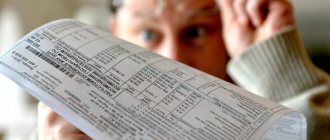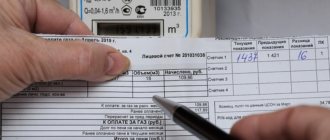According to Article 153 of the Housing Code of Russia, the procedure for making payments for a residential house or apartment, as well as the calculation of utility bills, is determined from the moment certain persons have obligations.
Responsibility under the law for the payment of utility bills in a residential premises lies with the tenant of this premises upon concluding a social tenancy agreement, when the document comes into force.
The tenant of residential real estate for state or regional purposes pays utility bills from the moment the lease agreement for the apartment was concluded.
The tenant of residential real estate for state or regional purposes is also responsible from the moment the contract is drawn up and comes into force.
An employee of a housing cooperative undertakes to pay utility bills after he is provided with residential premises for use by the housing society.
When ownership of real estate arises, the owner is responsible for paying utility bills, that is, when the real estate is registered in the manner established by the state.
Who pays utility bills - the registered owner or the owner?
The question of who pays utility bills - the registered person or the owner - is often something that owners and people registered in the apartment cannot figure out. However, in practice, everything here is more than clear.
According to Article 30 of the Housing Code of Russia, the owner must pay all the costs of maintaining his apartment, and if such a premises is considered a general-purpose apartment for property owners in an apartment building, then the owner must also pay all the costs of operating the apartment.
If we are talking about a multi-apartment building, then the property owners who are responsible for managing the property must contribute:
- utility fees;
- payment for accommodation according to the contract.
Such an agreement is concluded with citizens who carry out certain types of activities, the owners pay for their services and pay for utility bills under an agreement concluded with citizens who implement these types of work.
Therefore, regardless of who currently lives in the apartment or is registered in it, payments and all expenses for the property are borne by the owner of the property.
If the owner does not pay on time or not in full, then after a while he may have difficulties. For example, when selling a premises with unpaid utilities, a regional settlement company may sue it.
When renting
The owner of the property can rent out his home, but before doing so, it is necessary to conclude a rental agreement for the property.
The contract must indicate that:
- the property can be disposed of by the tenant;
- and he is responsible for paying for temporary accommodation.
There is a lot of debate going on these days about who pays for utilities?
If the apartment rental agreement does not specify special conditions, then all utility costs are borne by the direct owner of the premises.
In order for the tenant to pay the payments on his own, it is necessary to draw up an agreement in which it is indicated that the owner transfers the payment of utility services under his responsibility.
From which moment?
In practice, it is often unclear how to draw up a lease agreement, who should pay for utilities and from when:
- The first method involves payment of payments by the landlord. After drawing up the agreement, invoices from the settlement center will be sent to his name, and he must pay them in any convenient way.
- The second method is that all expenses for maintaining the apartment are paid by the renter. When concluding an agreement, both parties must come to a common conclusion that the tenant will subsequently draw up an agreement with housing organizations.
- After which the receipts will be sent to his account, and he will pay for them himself. And the landlord adds expenses on utility bills to the amount of the cost of renting the property.
When using the third method, the tenant pays for utilities, but there is no need to enter into any agreements with utility services.
All transactions with service providers are carried out by the employer himself, and then issues an invoice to the renter indicating the resources expended.
For the children
All utility costs for children must be paid by their parents in full.
Moreover, even if one of the spouses does not live and is not registered in the premises, he is still responsible for paying for utilities.
Even paying alimony does not relieve parents from the obligation to pay for services for the child’s accommodation in the apartment.
Housing in shared ownership
According to the Civil Code, the owner of the property is responsible for the maintenance of the property, as well as for paying for utilities in proportion to his share of the property.
When the owner becomes the owner of the apartment, his responsibilities include paying utility bills.
This includes:
- housing maintenance and repair;
- elevator service fee;
- heating payment.
In addition, homeowners need to pay for consumed resources according to installed metering devices.
If the premises are not used by the owners, then this is not a legal basis for non-payment of utilities.
In case of non-stay
When the owner of the premises has been absent from the apartment for a long time, you can use the recalculation procedure. This applies to utility bills, which are calculated according to established consumption standards, that is, according to meters.
Recalculation is carried out according to the established share of the owner in the apartment.
Only certain utility payments can be recalculated - cold and hot water, electricity, gas and sewerage. For such services, recalculation can be performed even in the absence of metering devices.
The recalculation procedure is carried out only on the basis of a written application from the owner.
With the application he must submit:
- document on temporary registration where he actually resides;
- copies of receipts for payment of utilities at the new location.
Here you can apply for recalculation of utility bills.
Who must fulfill the obligation
According to Article 155 of the Housing Code of the Russian Federation, people who own property and use public services are required to pay fees on time. The consumer is obliged to pay for the following services:
- Water supply.
- Electricity supply.
- Heating.
- Maintenance of the total area.
- Current and major repair work.
According to Article 209 of the Civil Code of the Russian Federation, a person who owns real estate has the right to dispose of it at his own discretion. He can rent out housing, register and register other people.
When several people live in an apartment, they may have a dispute over who will pay for the service received. There are several ways to resolve a controversial situation:
- Divide the total amount into equal shares.
- Conclude an agreement on what services each party will pay for and in what amount.
Regardless of the decision made, citizens must put everything in writing. If this condition is specified in the terms of the lease agreement, then an additional agreement is not required.
It often happens that tenants move out without paying the rent. In this case, the concluded agreement will help the owner to collect the debt in court.
If the parties do not draw up an agreement, then the owner of the property will have to fulfill the obligation to the service organization. If there is a properly executed agreement, the tenant is obliged to pay, even if he is not registered in the given living space.
Personal accounts section
According to Russian legislation, if an apartment is in shared ownership, then each of the owners can pay for the apartment using a separate receipt, but within the framework of a common personal account.
That is, the payment invoice may consist of two invoices for different participants in proportion to their shares.
To split payments, each owner must submit a written application to the housing company or local homeowners association, along with property documents.
Here is a sample application for the personal accounts section.
Video about payment
Article 153 of the Housing Code of the Russian Federation states that utilities must be paid on time under any conditions, even if the premises are empty. Payment for services provided is accrued from the moment a certain person assumes responsibility for the apartment.
Often, the owner and the registered person in the premises are different individuals. And then the question arises: who pays for the apartment: the owner or the registered owner? This article will discuss this problem in detail.
Public utilities
Regardless of who owns the apartment, who is registered in it and who actually lives in it, it is necessary to pay for utilities on time, including the established list of services:
- Utility fees;
- Payment for the maintenance of common property;
- Electricity supply;
- Water supply;
- Water disposal (sewage);
- Heating;
- Home maintenance and repair;
- Contribution for major repairs.
If a homeowners association management method is implemented in a house, then you also need to pay for the services of this organization, which are fixed at a certain amount.
The management company maintains the house and supplies resources. It is elected at a general meeting of residents.
Thus, one person from an apartment building cannot refuse a certain service or autonomously choose another organization.
All data on the services provided by the management company is confirmed by meter readings, approved standards, work completion certificates and other documents.
Dependence on the number of residents
Most payments are calculated based on meter readings or the total area of the apartment. The number of residents does not affect the amount of payment.
If there are no meters for electricity, water or gas consumption, then the calculation will be made according to the standards. And in this situation, the number of people registered in the apartment will affect the calculation base.
In any case, the number of residents will affect the total cost of services such as solid waste removal, elevator use and staircase lighting.
Legislation
Payment, according to the housing code, is divided into several parts:
- public utilities;
- resources consumed;
- use of the premises, if rented.
At the same time, renting premises can be both social and commercial. The owner himself decides under what conditions to trust his property. Nevertheless, no matter who uses the premises, it is necessary to pay for it and utility services.
The legislation openly dictates obligations to pay for the apartment. So, who is obliged to pay and when:
- Developer. Obliged to make payments from the time the building is put into operation until the buyer receives possession rights;
- Owner of the premises. Enters into responsibilities when ownership arises (after signing the deed of transfer of the apartment);
- The tenant of the premises from the moment the contract comes into force.
The list above does not say anything about the persons registered in a particular premises. One conclusion follows from this - the owner of the premises is responsible for the timely payment of any utilities.
The obligation to pay is established because the citizen uses the residential premises, and the management company has provided a certain service. If the owner of the premises does not pay or does so incompletely, then certain difficulties may arise in the future.
For example, when selling real estate that has debts on utility bills, a regional settlement company may sue its owner.
Moment of obligation
Relations in the field of utility payments are determined by the Housing Code of Russia on the basis of Article 153. It determines which persons are required to bear the cost of paying rent.
The moment of payment obligations is determined for several categories of persons:
- residential tenants;
- tenants;
- home owners.
For those who rent residential property, responsibility for paying utility bills begins as soon as the rental document comes into force. Such a document, depending on the type of real estate, may be a social tenancy agreement or an agreement on the rental of housing from a regional or state fund.
Tenants bear the burden of paying rent from the moment the lease is signed. If a citizen is an employee of a housing cooperative, he must begin payments immediately after the premises are provided to him for use.
For homeowners, the countdown begins from the moment the right is registered with government agencies.
As soon as a citizen becomes the owner of legal grounds for the use of residential premises, he is obliged to make payments on utility bills
Paying rent with a bank card via the Internet at any time is a convenient opportunity to save time on visits to the bank.
You can find out whether the rent depends on the number of people registered in the article on.
Practical observations
The right of ownership allows full disposal of real estate, ownership and use of it . And different persons can own and use the premises.
This right arises on the basis that the owner can provide his premises for free or paid use to third parties. And the conditions and procedure for living are specified in the rental agreement.
ATTENTION! Receipts for payment of utility services are issued to the owners; accordingly, he is responsible for it and is the legal payer.
You cannot simply force a registered person to pay utility bills. If the owner of the property wants to shift responsibility for the rent to the person registered there, then for this it is necessary to draw up an appropriate written agreement.
Fractional ownership
Often one residential premises belongs not to one, but to several persons.
Property can be divided into shares during the period of privatization, inheritance or as a result of marital divorce.
Regardless of this, every shareholder must pay for utilities. And how home owners decide to pay for services is a decision only for the owners themselves.
Practice shows that people rarely share utility bills. Usually, one person is trusted to pay the receipts, and the others reimburse the funds spent.
There is an opinion that if one of the shareholders does not live in the premises, then he does not need to make payments for utilities; the one who lives there must pay for everything. But this is a wrong position.
Everyone who has a share is required to pay utility bills, even if he does not live in the premises.
Otherwise, the owners of the remaining shares will be forced to pay off debts for the defaulter. The surest way to force a co-owner to pay is to go to court with all payment documents.
Separation of personal accounts
If the co-owner does not compromise and it is not possible to reach an agreement, then the owners have the right to divide the accounts. And there are several options:
- Payment of 1 receipt as a result of the conclusion of an agreement;
- 1 personal account, but several receipts;
- For one premises, create several separate accounts, where there will be different payers.
To split accounts, a written request to the management company is required. Costs will be divided among the owners according to their shares.
Download a sample application for division of a personal account
Exceptions to the rules
The law provides for cases in which the owner is not obliged to pay utility bills in whole or in part:
| Long term rental |
|
| Minor owners | If the owner of the home is a child, then his parents are responsible for utility payments in equal shares. This applies even to cases where one or both parents do not live with the minor. |
| Shared ownership |
|
| Property without occupancy |
|
There is a legal way to resolve this issue. By law, the owner of an apartment must pay part of the services where he actually lives, and part - where he is the owner.
If the address of a residential property does not match the owner’s registered address, you must contact the management company or the HOA. You must provide proof of registration and payment of rent at your place of residence.
Based on these documents, a recalculation will be made. In the future, all services for which fees are charged based on consumption will be provided at the place of registration. This will not relieve the owner from payments for maintenance, repairs and heating of the premises in which he is the owner.
To force registered persons to pay for the services consumed, you can threaten them with deregistration. The owner has the right to evict tenants by law.
The owner or tenant of residential property is responsible for paying utility bills.
To save on utility bills, you need to find out how heating rent is calculated and how you can optimize it.
You can find out what a certificate of no rent arrears looks like here.
You can find out how much rent will increase in 2021 here.
- Due to frequent changes in legislation, information sometimes becomes outdated faster than we can update it on the website.
- All cases are very individual and depend on many factors. Basic information does not guarantee a solution to your specific problems.
That's why FREE expert consultants work for you around the clock!
- via the form (below), or via online chat
- Call the hotline:
- Moscow and the Region
- St. Petersburg and region
- Regions
APPLICATIONS AND CALLS ARE ACCEPTED 24/7 and 7 days a week.
A registration stamp in your passport not only gives you the right to live at the address indicated in it, but also obliges you to pay rent. And we are regularly reminded of this in our receipts every month.
But it is still possible to identify a number of cases where the law allows you to relieve yourself of the obligation to pay rent even if you have registration.
Rental of property
The tenant can also pay for an apartment rented under a commercial lease agreement. This is possible if an agreement has been concluded and it states who is responsible for paying utility bills.
By concluding a rental agreement, the owner provides the premises with all its contents (furniture, household appliances) for use.
If the contract does not contain a separate clause that states that the tenant agrees to pay for utilities, then after signing it it is impossible to assign these obligations.
Non-residence
It happens that the person responsible for utility payments did not live in the apartment for a long time and it was empty. In this case, the rent was calculated according to the general procedure, but in fact not all services were used.
Here you can request a recalculation from the management company. To do this, you must attach documentary evidence of residence in another place and receipts for payment of all utilities for this period.
Download a sample application for recalculation due to absence
Whether the premises are empty or not, the owner of the property must pay for it according to all issued receipts. Only after this can you apply for recalculation
. In any case, the following are not subject to recalculation:
- Overhaul;
- Maintenance and repair of common property;
- Payment for resources used for general house needs;
- In winter, this also includes heating fees if the apartment does not have individual heat meters.
Based on the available evidence, the management company will recalculate. The money that was deposited will be counted towards future accruals.
Recalculation nuances
If a citizen did not temporarily live in the apartment, then he can apply to the Criminal Code to reduce payments. In this case, you must pay all invoices in good faith.
A citizen may be permanently located:
- at the place of temporary registration;
- business trip;
- in another state;
- in a hospital, sanatorium, boarding house;
- in the country;
- stay in a hotel, inn, campsite or other similar establishment.
In all of the above cases, a person can request an appropriate document stating that he lived for a certain time not at his place of permanent registration.
Payment orders must be attached to the certificate. A recalculation will be made based on the submitted documents. The money contributed will be applied towards future expenses.
If a person cannot reliably confirm his absence, then the amount of payment for previous months will not be changed.
Consequences of debt
The management company can take the following measures against persistent defaulters for utility services:
- Conduct explanatory conversations;
- Notify in writing of the existence of a debt;
- Publicly disclose lists of debtors;
- Accrue penalties;
- Disable services;
- Forcibly collect debt;
- Evict.
Penalties are calculated if the owner has not paid for services for more than a month . It is credited in the amount of 1/300 of the refinancing rate of the entire debt amount for each day of non-payment
. At the end of 90 days, the penalty increases to 1/130 of the bet. Also, after 90 days, the management company has the right to disconnect services.
The management company has the right to sue the debtor.
If a citizen is not able to prove the fact of payments, then the court will decide in favor of the Criminal Code.
Then the owner can pay off the debt on his own or the bailiffs will collect fees for it. They will seize accounts, property, and send a writ of execution to work. Sometimes the debtor is also prohibited from traveling outside the state.
If you fail to pay utility bills within six months, you may lose your right to own your home. But, if a citizen lives in his own apartment and has no other housing, then it will not be possible to evict him.
It is necessary to pay housing and communal services under any circumstances. If you have questions about the amount of payments or the sequence of transferring funds, you can always consult your management company for free.
Today it is impossible to live without modern comforts - electricity, gas, hot water delivered directly to apartments. But at the same time, you need to pay utility bills to all property owners.
How to get a tenant to pay
It is possible to force an unscrupulous tenant to pay for rent only if the following conditions have been met:
- The agreement complies with the requirements established by law, and it defines the procedure for settlements with the management company.
- The owner pays tax on the income received from rental. Many, not wanting to pay tax, do not register the agreement and hide the fact of receiving profit from government agencies. This makes it invalid and useless when considering the issue of debt in court.
Read more: Basov and Khitrov agreed to get it from Petrov
If these conditions are met, the injured person can go to court. When drawing up a claim in court, the applicant should rely on the Code of Civil Procedure of the Russian Federation. According to this legal act, the service provider has grounds for forced collection of unpaid amounts.
In addition to the requirement to close the debt, the applicant has the right to demand compensation for legal costs and moral damage. In practice, such claims are almost always satisfied. After receiving a court decision, it is better for the victim to contact the bailiffs. They have a number of powers and will be able to force the defaulter to repay the debt.
Pay for what
Utilities are a collective concept that consists of various services:
- provision of electricity;
- sewerage;
- hot and cold water;
- central heating;
- garbage removal;
- gas supply.
The purpose of such a service is to provide a comfortable life for residents of multi-storey buildings.
The quality and quantity of utilities is directly affected by the location of housing. Buildings built according to modern designs are equipped with utilities that supply drinking cold water to the house around the clock.
Also, hot water, high-quality electricity, and natural gas are supplied to the housing. In the absence of a gas mains, the resource is delivered to buildings in cylinders
. All this ensures a constant optimal temperature in inhabited areas.
Who pays
The question of who should pay the rent: the owner or the registered tenant often causes debate. But a competent lawyer will answer it without difficulty
.
Article 30 of the Housing Code of Russia states that the owner of the property pays for all housing and communal services provided in full .
The premises may also be property of general purpose for several owners, in such a situation they pay for it jointly. All property owners who use it must pay:
- public utilities;
- payment for accommodation established in the contract.
A little about what kind of agreement this is. It is issued with citizens who are engaged in certain activities. Apartment owners pay money for their work, and also pay the CG according to the signed agreement
.
If a wife registers with her husband, then by law she does not have to pay for utilities
. The husband registers it voluntarily, but if he is the owner, then he pays off the receipts.
ATTENTION! Whether the owner must pay for utilities, if not registered, is not affected by the fact of his residence in the apartment.
There is no fee for registered persons. Only the property owner should do this. If payments are not made on time, he exposes himself to the risk of many problems.
. If you have debts for the property management, it is quite difficult to put the premises up for sale, and the management company has recently very often demanded the debt be repaid in court.
Moment of obligation
Relations in the field of utility payments are determined by the Housing Code of Russia on the basis of Article 153. It determines which persons are required to bear the cost of paying rent.
The moment of payment obligations is determined for several categories of persons:
- residential tenants;
- tenants;
- home owners.
For those who rent residential property, responsibility for paying utility bills begins as soon as the rental document comes into force. Such a document, depending on the type of real estate, may be a social tenancy agreement or an agreement on the rental of housing from a regional or state fund.
Tenants bear the burden of paying rent from the moment the lease is signed. If a citizen is an employee of a housing cooperative, he must begin payments immediately after the premises are provided to him for use.
For homeowners, the countdown begins from the moment the right is registered with government agencies.
As soon as a citizen becomes the owner of legal grounds for the use of residential premises, he is obliged to make payments on utility bills
Paying rent with a bank card via the Internet at any time is a convenient opportunity to save time on visits to the bank.
You can find out whether the rent depends on the number of people registered in the article at this link.
Lease contract
Renting an apartment today is easy, but it cannot be done without a property lease agreement. The following items must be entered into it:
- the tenant uses the rented apartment;
- The tenant pays utilities.
But in reality, many employers do not agree with such conditions and refuse to pay for the gas, water, and electricity they receive. One thing is important here: if this condition is not specified in the contract, then in any case the owner will have to pay the housing and communal services receipts, so this clause needs to be stated in the contract so that the tenant is responsible for payment.
Who pays the tenant or the landlord?
If the landlord must pay, then he contributes money for the housing and communal services receipts sent. It happens like this: after concluding a rental contract, payments are sent to his address, which he will repay in any way convenient for him.
When a tenant is required to pay utility bills, this is documented in the appropriate property lease contract. Both parties to the contract agree that the tenant draws up an agreement with the management company, as a result of which payment documents will be sent to the landlord. The latter will deduct payments for housing and communal services from the cost of renting an apartment.
In the latter option, all responsibilities for timely payment of housing and communal services receipts are assigned to the tenant, but there is no need to draw up a contract with the management company. This is done in a slightly different way: the employer pays, and then presents the landlord with an invoice.
The person does not live in an apartment
There are cases when the persons who own the premises are not in the apartment for a long time. In such a situation, they use recalculation
. The purpose of this financial transaction is that the costs of operating the premises are calculated using electronic metering devices for the absent person.
When ownership is shared, this procedure is performed based on the proportional size of the share. Such recalculation is not carried out for all services, but only for electricity, gas and water.
.
Rents are also recalculated in the absence of metering devices
.
To do this, you need a free form application from the owners
. You need to collect for it:
- certificate of stay in another place;
- bills for utility costs in another room.
Original receipts are not required; photocopies are provided.
Registered in one place but living in another
This means when someone registered in one apartment temporarily lives in another place (that is, has not left permanently, reserving the right to return).
In this case, the tenant has the right to be partially exempt from rent for the entire period of his absence (provided that it lasted more than 5 days in a row).
If he is registered in an apartment without being its owner, he does not pay for:
- all utilities that are charged according to meter readings (water and sewerage, electricity, gas). If there are no meters, but the technical ability to install them is available, alas, it will not be possible to get rid of paying for utilities,
- garbage removal - if the region has a calculation system based on the number of registered residents,
- maintenance and repair of housing, as well as major repairs - these costs are borne only by the owner of the residential premises.
He will only have to pay for heating (including gas or electricity costs if they are used for heating).
Well, the owner, even if he does not live in the apartment, will in any case have to pay for the maintenance and repair of the home, as well as contributions for major repairs.
Confirmation of a tenant's temporary absence in order to be exempt from rent must be done every six months.








